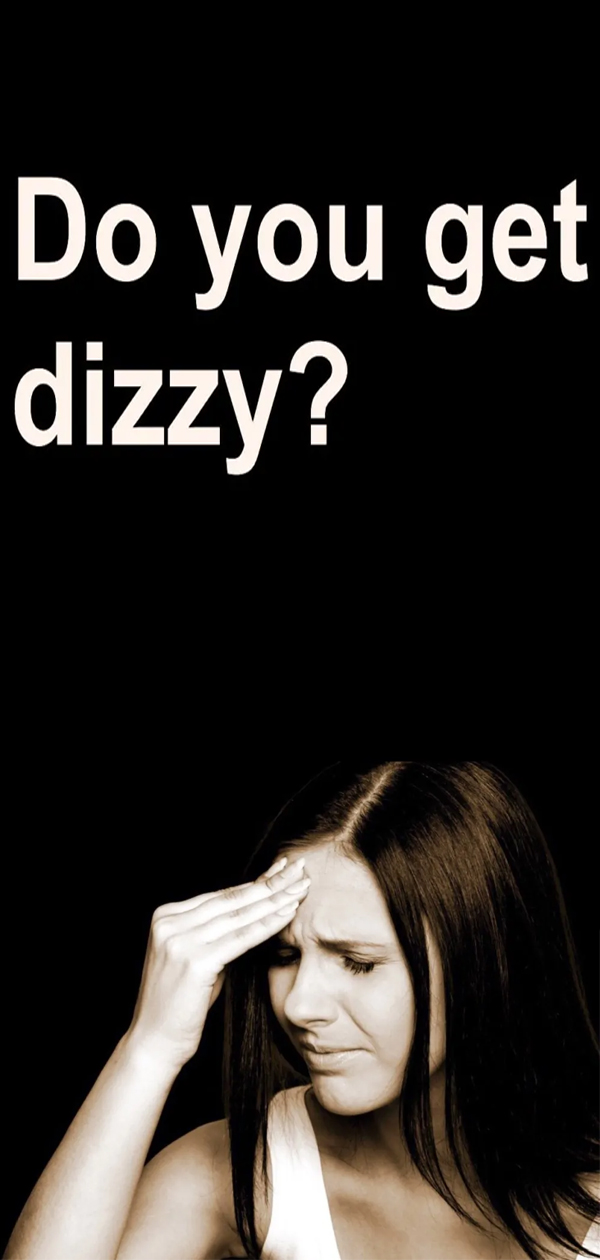“Vertigo makes it feel like the floor is pitching up and down. Things seem to be spinning. It’s like standing on the deck of a ship in really high seas.” – Laura Hillenbrand
Feeling dizzy can happen to everyone, sometimes for no apparent reason! Standing up too quickly, being dehydrated, being overtired… all of these are common causes for dizziness that aren’t a huge cause for concern. However, sometimes the dizziness is more chronic than we realize. If you find yourself often getting dizzy after standing up, or simply just moving around, there may be something more than just a glass of water can fix.
Vertigo is a type of chronic dizziness that is chronic. Short, isolated dizzy spells may not always mean that vertigo is the culprit, but when those symptoms seem to last for longer than a few minutes, it may be a sign that someone has vertigo.
Dr. Robert Jackson defines vertigo as, “a symptom.” He continues to mention, “It is a sign that something is wrong and there is a cause! There is more than one cause for vertigo and symptoms like it such as dizziness and brain fog.” It’s important to know the common signs of vertigo, as well as the common causes.
Here Are 5 Signs You Have Vertigo
1. The Symptoms Of Dizziness Last More Than An Hour
As previously stated, isolated incidents of dizziness don’t always mean vertigo, but when that dizziness lasts for longer than an hour, it may mean that vertigo is behind it.
The medical director of a special U-M center devoted to diagnosing and treating balance disorders, Hussam El-Kashlan, M.D., mentioned, “For some people, vertigo can be very debilitating. During the acute attack, the person is totally incapacitated. They can’t do anything for themselves and they’re basically bedridden or lying on the ground until the attack passes. Often it’s accompanied by other symptoms such as nausea and vomiting.”
Keep an eye on your dizziness and check and see how long it lasts. A quick dizzy spell may not because of concern, but if the symptoms last longer than an hour, it’s time to make a doctor’s appointment.
2. The Symptoms Of Dizziness Go On For Days
If you have one, isolated dizzy spell for more than hour, it might not be vertigo. If an hour long dizzy spell only occurs once, it might be due to other factors. However, if these symptoms last persistently over the course of several days, you’re probably dealing with vertigo.
3. The Symptoms Occur Together
Symptoms of vertigo range from dizziness to nausea to headaches and even a loss of balance that can cause falls. Only getting a headache doesn’t mean that you have vertigo. However, if all of these symptoms occur together, it’s more than likely that you’re dealing with vertigo.
4. The Symptoms Cause Fall Or Injury
It’s important to see a doctor if the dizziness causes any type of loss of balance that creates injury. If your headache or dizziness is so severe that you’re unable to stay upright, it’s most likely a sign that you have vertigo, and you’ll want to get it checked out as soon as possible.
5. The Symptoms Interfere With Your Daily Life
If you have a little dizzy spell when you stand up too quickly, or stress headaches every now and then, it most likely doesn’t interfere with your day-to-day life. Symptoms of vertigo are severe and long-lasting and can cause issues in your daily life.
Knowing the symptoms of vertigo is an important first step to getting it treated. However, another important step is knowing what the root cause of it is. Going in with more knowledge of the common causes of vertigo can help your doctor treat you more efficiently. “Once diagnosed, the proper treatment is to put those little particles, called canaliths, back where they belong,” explains Dr. Marc I. Leavey.
Here Are Some Of The Common Causes Of Vertigo
1. Inner Ear Vertigo
One of the most common causes of vertigo is an inner ear issue. The inner ear is responsible for all of your balance, and it has a system that’s filled with fluid. When you move, so does the fluid, which helps you stay balanced and stops you from feeling dizzy. When this stops functioning, your balance becomes distorted and you can experience extreme dizziness. This is one of the most common causes of vertigo, and can be treated in a number of ways, from physical therapy to antibiotics.
2. Neurological Vertigo
This type of vertigo occurs when there’s an issue with your central nervous system. A neurologist would normally address this type of problem. Things like stroke, multiple sclerosis or tumors can cause your central nervous system to mess up and vertigo to occur. Fortunately, this is one of the rarest causes of vertigo, and only happens to about one percent of the population.
3. Circulation Vertigo
Blood getting to your brain helps keep your body balanced, so when something affects that, you may experience dizziness. Drops in your blood pressure can cause your body to experience vertigo, and things like poor blood circulation can be the culprit. A doctor can help you improve the cardiovascular issue that is causing the vertigo, which can not only improve your symptoms but your overall health, as well.
4. Drug-Related Vertigo
This doesn’t always mean illegal drugs, either! There are all kinds of medications that, while good for you, can cause a drop-in blood pressure, or just make you feel lightheaded and dizzy. Things like antidepressants, sleeping medications, pain relievers and even blood pressure medication can all cause symptoms of vertigo. If you begin experiencing vertigo after starting medication, talk to your doctor and see about switching drugs. There’s usually an alternative to every medication.
5. Psychological Vertigo
Stress and anxiety can cause vertigo-like symptoms if you’re not careful with managing those feelings. While the name “psychological vertigo” may suggest that you’re making it up, that’s not entirely true. Stress and anxiety can cause real, physical effects to your body. If you’ve been undergoing a lot of stress and have had persistent symptoms of vertigo, it may be time to see a psychiatrist who can help you out.
Vertigo isn’t fun, but fortunately, it is very treatable. Being able to stop the symptoms and analyze what’s going on in your life will help you make the right call in getting a diagnosis and treatment for your vertigo. Life doesn’t have to always be dizzy! There are steps you can take to start seeing straight again.


